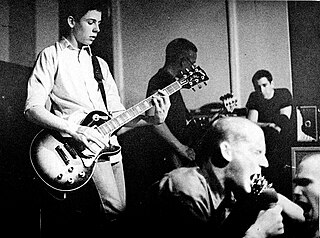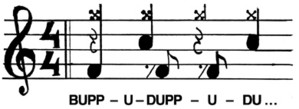Related Research Articles
Grindcore is an extreme fusion genre of heavy metal and hardcore punk that originated in the mid-1980s, drawing inspiration from abrasive-sounding musical styles, such as thrashcore, crust punk, hardcore punk, extreme metal, and industrial. Grindcore is considered a more noise-filled style of hardcore punk while using hardcore's trademark characteristics such as heavily distorted, down-tuned guitars, grinding overdriven bass, high-speed tempo, blast beats, and vocals which consist of growls, shouts and high-pitched shrieks. Early groups such as England's Napalm Death are credited with laying the groundwork for the style. It is most prevalent today in North America and Europe, with popular contributors such as Brutal Truth and Nasum. Lyrical themes range from a primary focus on social and political concerns, to gory subject matter and black humor.

Hardcore punk is a punk rock subgenre and subculture that originated in the late 1970s. It is generally faster, harder, and more aggressive than other forms of punk rock. Its roots can be traced to earlier punk scenes in San Francisco and Southern California which arose as a reaction against the still predominant hippie cultural climate of the time. It was also inspired by Washington, D.C., and New York punk rock and early proto-punk. Hardcore punk generally eschews commercialism, the established music industry and "anything similar to the characteristics of mainstream rock" and often addresses social and political topics with "confrontational, politically charged lyrics".

AFI is an American rock band from Ukiah, California, formed in 1991. Since 1998, it consists of lead vocalist Davey Havok, drummer and backing vocalist Adam Carson, bassist, backing vocalist and keyboardist Hunter Burgan, and guitarist, backing vocalist and keyboardist Jade Puget. Havok and Carson are the sole remaining original members. Originally a hardcore punk band, they have since delved into many genres, starting with horror punk and following through post-hardcore and emo into alternative rock and gothic rock.

Alec Empire is a German experimental electronic musician who is best known as a founding member of the band Atari Teenage Riot, as well as a solo artist, producer and DJ. He has released many albums, EPs and singles, some under aliases, and remixed over seventy tracks for various artists including Björk. He was also the driving force behind the creation of the digital hardcore genre, and founded the record labels Digital Hardcore Recordings and Eat Your Heart Out Records.

Crust punk is a fusion genre of anarcho-punk and extreme metal that originated in the early to mid–1980s in England. Originally, the genre was primarily mid-tempo, making use of metal riffs in a stripped-down anarcho-punk context, however many later bands pushed the genre to be more grandiose, faster or more melodic. Often songs are political, discussing environmentalism, anarchism, anti-capitalism, feminism and animal rights.

Flipper is an American punk rock band formed in San Francisco, California in 1979, continuing in often erratic fashion until the mid-1990s, then reuniting in 2005. The band influenced a number of grunge, punk rock and noise rock bands. Their slowed-down, bass-driven and heavily distorted style of punk is considered to have inspired bands such as the Melvins and Nirvana, whose bass player Krist Novoselic played with the band in the 2000s.

D-beat is a style of hardcore punk, developed in the early 1980s by imitators of Discharge, after whom the genre is named, as well as a drum beat characteristic of this subgenre. D-beat is known for its "grinding, distorted and brutally political" sound. Discharge may have themselves inherited the beat from Motörhead and the Buzzcocks. D-beat is closely associated with crust punk, which is a heavier, more complex variation. The style was particularly popular in Sweden, and developed there by groups such as Crude SS, Anti Cimex, Mob 47, and Driller Killer. Other D-beat groups include Doom and the Varukers from the UK; Disclose from Japan; Crucifix and Final Conflict from the U.S.; Ratos de Porão from Brazil; and MG15 from Spain. While the style initially developed in the early 1980s, a number of new groups working within the subgenre emerged in the mid-1990s. These include the Swedish groups Wolfbrigade, Totalitär, Avskum, Skitsystem, and Disfear.
Japanese hardcore is the hardcore punk scene in Japan, which originated to protest the social and economic changes sweeping the country in the 1980s. The band SS is regarded as the first, forming in 1977. Bands such as The Stalin and GISM soon followed, forming in 1980 and 1981 respectively. Occasionally, Japanese hardcore musicians include elements of avant-garde, crossover thrash, thrash metal, anarcho-punk, horror punk, D-beat, post-hardcore and grindcore in their songs.

Melodic hardcore is a broadly defined subgenre of hardcore punk with a strong emphasis on melody in its guitar work. It generally incorporates fast rhythms, melodic and often distorted guitar riffs, and vocal styles tending towards shouting and screaming. Nevertheless, the genre has been very diverse, with different bands showcasing very different styles. Many pioneering melodic hardcore bands, have proven influential across the spectrum of punk rock, as well as rock music more generally.

Murphy's Law is an influential American hardcore punk band from New York City, formed in 1982. While vocalist Jimmy Drescher remains the only founding member of the band, the line-up has consisted of numerous musicians who have performed with a diverse selection of musical acts across multiple genres, such as Skinnerbox, Danzig, The Bouncing Souls, Mucky Pup, Dog Eat Dog, Hanoi Rocks, Agnostic Front, Warzone, Cro-Mags, D Generation, New York Dolls, Joan Jett & the Blackhearts, The Slackers, Thursday, Skavoovie and the Epitones, White Trash and Glen Campbell.
Post-metal is a music genre rooted in heavy metal but exploring approaches beyond metal conventions. It emerged in the 1990s with bands such as Neurosis and Godflesh, who transformed metal texture through experimental composition. In a way similar to the predecessor genres post-rock and post-hardcore, post-metal offsets the darkness and intensity of extreme metal with an emphasis on atmosphere, emotion, and even "revelation", developing an expansive but introspective sound variously imbued with elements of ambient, noise, psychedelic, progressive, and classical music, and often shoegaze and art rock. Songs are typically long, with loose and layered structures that discard the verse–chorus form in favor of crescendos and repeating themes. The sound centres on guitars and drums, while any vocals are often but not always screamed or growled and resemble an additional instrument.

Kaaos was a Finnish hardcore punk band from Tampere, Finland. Formed in March 1980, they were one of the first hardcore punk bands in Finland to release a record. Though their lineup has changed frequently through the years, the band is somewhat active through the years. Only the band's guitarist Jakke remained as the original member and grew to become the center figure of Kaaos.
Malaysian rock music has a rich and diverse history, spanning various subgenres such as rock kapak, punk rock, hardcore, post-hardcore, metalcore, and post-rock. Over the decades, Malaysia has developed a thriving underground music scene, with its origins rooted in the 1980s and a continuous evolution in the following decades. This genre is popular both locally and internationally, with many bands achieving success in countries such as Indonesia, Singapore, and Japan.
Since the mid-1970s, California has had thriving regional punk rock movements. It primarily consists of bands from the Los Angeles, Orange County, Ventura County, San Diego, San Fernando Valley, San Francisco, Fresno, Bakersfield, Alameda County, Sacramento, Lake Tahoe, Oakland and Berkeley areas.
Bomb Factory is a band from Tokyo, Japan with styles influenced by 1970s and '80s hardcore punk, hard rock, and heavy metal music. Although their mother tongue is Japanese, almost all the music they have produced since 1997 has English song titles and lyrics.
Crossover thrash is a fusion genre of thrash metal and hardcore punk. The genre emerged in the mid–1980s, when hardcore punk bands, such as Suicidal Tendencies, Cryptic Slaughter, Corrosion of Conformity and Dirty Rotten Imbeciles, began to incorporate the influence of thrash metal. At this time, the genre was particularly prominent in the New York hardcore scene, where groups including Agnostic Front, Leeway, Cro-Mags and Stormtroopers of Death were widely influential.
Punk rock and hardcore punk in Brazil originated in the late 1970s, influenced by bands such as Sex Pistols, The Clash, Stiff Little Fingers, and The Ramones. The first known Brazilian punk rock band was Restos de Nada, which appeared in mid-1978 and set the stage for the emergence of many other bands that formed the Brazilian punk scene.
Punk jazz is a genre of music that combines elements of jazz, especially improvisation, with the instrumentation and performance style of punk rock. The term was first used to describe James Chance and the Contortions' 1979 album Buy. Punk jazz is closely related to free jazz, no wave, and loft jazz, and has since significantly inspired post-hardcore and alternative hip hop.

Canadian hardcore punk originated in the early 1980s. It was harder, faster, and heavier than the Canadian punk rock that preceded it. Hardcore punk is a punk rock music genre and subculture that originated in the late 1970s. The origin of the term "hardcore punk" is uncertain. The Vancouver-based band D.O.A. may have helped to popularize the term with the title of their 1981 album, Hardcore '81. Hardcore historian Steven Blush said that the term "hardcore" is also a reference to the sense of being "fed up" with the existing punk and new wave music. Blush also states that the term refers to "an extreme: the absolute most Punk." An article in Drowned in Sound argues that 1980s-era "hardcore is the true spirit of punk", because "after all the poseurs and fashionistas fucked off to the next trend of skinny pink ties with New Romantic haircuts, singing wimpy lyrics", the punk scene consisted only of people "completely dedicated to the DIY ethics". One definition of the genre is "a form of exceptionally harsh punk rock."
Hogan's Heroes was an American hardcore punk band formed in New Jersey in 1984. During their time they recorded three full lengths for California label New Red Archives. The band broke up in 1993.